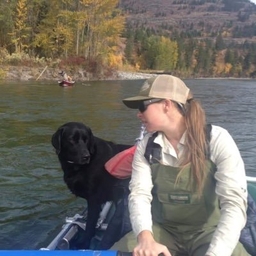
Kimberly McCoy
Producer at Short Wave
(she/her) / producer @NPRShortWave /‘19 @AAASMassMedia Fellow at PBS @NewsHour / BioChem PhD / Avid Ice angler / Punny /🗻 and 🐕❤️er
Articles
-
3 weeks ago |
wrvo.org | Hannah Chinn |Emily Kwong |Kimberly McCoy
Most undergrads don't get the chance to work with museum-preserved specimens of deep sea anglerfish. Then again, Rose Faucher isn't most undergrads. "The fish world is actually pretty small, and it feels kind of like everybody knows everybody," says Faucher, who graduated from Rice University recently with her bachelor's degree in cell biology and genetics. "They'll FedEx you a fish that has been sitting in a jar since like 1965 ...
-
3 weeks ago |
wrvo.org | Kimberly McCoy |Emily Kwong |Rachel Carlson |Rebecca Ramirez
As artificial intelligence seeps into various areas of our society, it's rushing into others. One area it's making a big difference is protein science. We're talking the molecules that make our cells work. AI has hurtled the field forward by predicting what these molecular machines look like, which tells scientists how they do what they do — from processing our food to turning light into sugar.
-
1 month ago |
wfdd.org | Megan Lim |Eleanor Beardsley |Kimberly McCoy
0:00 There was an error loading the media player. Support quality journalism, like the story above, with your gift right now.
-
1 month ago |
npr.org | Regina G. Barber |Kimberly McCoy |Rachel Carlson |Rebecca Ramirez
Why this physicist says we shouldn't write off wormholes Download Embed <iframe src="https://www.npr.org/player/embed/1252360718/1269327926" width="100%" height="290" frameborder="0" scrolling="no" title="NPR embedded audio player"> According to physicist Ron Gamble, there is a non-zero chance that scientists could find a wormhole.
-
1 month ago |
wrvo.org | Emily Kwong |Rachel Carlson |Kimberly McCoy
There are over 1400 species of bats found around the world. And the way they navigate is hugely varied. The vast majority are using, as you might expect, echolocation. That's where an animal uses reflected sound to navigate. But echolocation is not the only sense that they use. When it comes time to find and hunt their prey, bats will use their eyes. Some rely heavily on smell. And some have evolved the ability to eavesdrop on their future meals.
Try JournoFinder For Free
Search and contact over 1M+ journalist profiles, browse 100M+ articles, and unlock powerful PR tools.
Start Your 7-Day Free Trial →X (formerly Twitter)
- Followers
- 1K
- Tweets
- 2K
- DMs Open
- No

RT @kristinjbarker: Never thought I'd see the day when Wildlife Crossings was formally proposed as a LEGO kit. Then again I haven't touched…

RT @NPRShortWave: Short Wave is stepping back from Twitter, in solidarity w/ many @NPR accounts: https://t.co/oL7GNbV1GJ Thank you for bei…

RT @emilykwong1234: The layoffs at NPR did affect Short Wave. Our team is incredibly bonded. We are processing what this means for our show…
